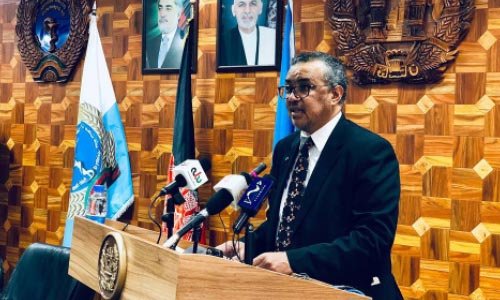KABUL - World Health Organization (WHO) Director-General Dr Tedros Adhanom Ghebreyesus met with His Excellency Dr Ferozuddin Feroz at the Ministry of Public Health on the first day of his two-day visit to Afghanistan, commending the progress made in public health services in the challenging context, and calling for the country and partners to continue efforts to increase resources to build up a health system for all Afghans and fas- track polio eradication.
During his first official visit to the country as WHO Director-General, Dr Tedros, accompanied by WHO Regional Director for the Eastern Mediterranean (EMRO) Dr Ahmed Al-Mandhari, will be meeting with senior government officials including HE President Dr Ashraf Ghani and HE Chief Executive Dr Abdullah Abdullah and the Council of Ministers. He will see first-hand WHO supported programmes and witness some of the pressing health issues the Afghan people face every day.
Dr Tedros launched the “Integrated Package of Essential Health Services 2019” with Dr Feroz at the meeting on 5 January. The newly developed package merges and updates the Basic Package of Health Services and the Essential Package of Hospital Services, and for the first time includes interventions for emergency trauma care and the prevention and provision of basic care for the most common chronic diseases.
Dr Feroz appreciated the continuing support from WHO and the international community, saying: “financing and implementation of this package will be a major step in addressing the growing burden of noncommunicable diseases and trauma. It is therefore essential that this package is sufficiently funded. We call for continued support of WHO and other international partners for technical and financial assistance’.
Dr. Feroz also reemphasized the commitment for eradicating polio in Afghanistan. “Today, 90% districts of the country remain polio free. We had setbacks in the South and the East, but we are addressing those challenges by developing alternate strategies and implementing the new National Emergency Action Plan in 2019.”
Speaking with the Minister, Dr Tedros appreciated the extraordinary efforts the government of Afghanistan made in eradicating polio, saying that “Despite intense efforts, the current situation is not where we want it to be. We recognize the unique challenges in polio eradication, and appreciate the initiatives and efforts of the government of Afghanistan in addressing the remaining challenges,” Dr Tedros said. “At the same time as we work intensively to finish the job of polio eradication, WHO is committed to working with the government of Afghanistan to strengthen its health system on the road towards universal health coverage."
Dr Ahmed Al-Mandhari commended Afghanistan on the progress it has made in providing public health services over the past 15 years. “Due to a sustained focus on primary healthcare and smart investments in essential health packages, key health indicators have substantially improved. However, some indicators remain worrisome,” WHO’s Regional Director said. “It is good to note that the updated Integrated Package of Essential Health Services, being launched today, has an expanded scope and includes areas like noncommunicable diseases and trauma care. WHO is fully committed to assisting the Government of Afghanistan in its implementation.”
Dr Tedros and Dr Ahmed Al-Mandhari plan to visit hospitals in Kabul later today to meet and interact with frontline medical workers and patients. They will witness first-hand the humanitarian health needs in Afghanistan and the assistance needed to develop the capacities of the local health system. (PR)
Home » Afghanistan » WHO Director-General Visits Afghanistan
WHO Director-General Visits Afghanistan

